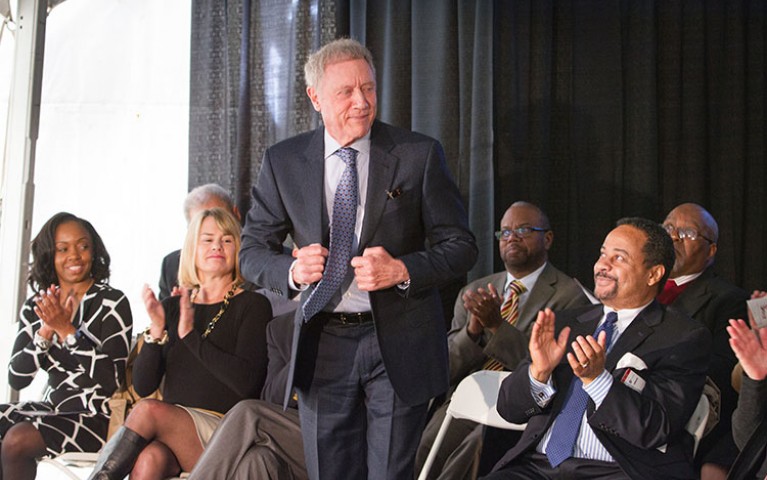Project HOME Celebrates Grand Opening and Building Dedication of Stephen Klein Wellness Center in North Philadelphia

Project HOME today held an official grand opening and dedication of its newest center: the Stephen Klein Wellness Center (SKWC), an architecturally magnificent 28,600-square-foot Federally Qualified Health Center (FQHC)*. The center is located at 21st and Cecil B. Moore Avenues, the second-poorest zip code in Philadelphia and a federally-designated Medically Underserved Area (MUA)**. Residents in this region experience unemployment at twice the city’s average rate. Roughly 70 percent of households have incomes less than $35,000 per year, and nearly half of adults and children live at or below the federal poverty level.
Named for lead funder Stephen Klein — a champion of this project for several years — the center services include primary care, behavioral health care, dental care, a pharmacy, wellness classes, a Philadelphia Freedom Valley YMCA with babysitting services, and a number of additional services that respond to what the community has identified as its greatest needs. The SKWC serves as a site for a Medical-Legal Partnership (MLP) through the Legal Clinic for the disabled. A community advisory board worked together with the Project HOME and Jefferson Health System’s Family Medicine staff to design an offering of services that extends beyond medical care and focus on a more holistic approach that centers on wellness and prevention.
Project HOME, with Jefferson Family Medicine, has been providing healthcare services for almost 20 years. The new center enables Project HOME to significantly expand healthcare and medical services to more people experiencing homelessness. The staff also provides services to community residents who currently do not have access to high-quality healthcare and wellness programs. Today’s grand opening ceremony brought together public, private, philanthropic, nonprofit and community partners who have worked together over the last two years to plan, build, and staff a center that has the potential to quickly become a community anchor for thousands. The project was spearheaded by Project HOME’s VP of Healthcare Services, Monica McCurdy, and the VP of Real Estate Development, Janet Stearns.
“There has been a phenomenal level of community spirit and involvement as we have worked with our many partners to make this vision become a reality today,” said Project HOME co-founder and Executive Director Sister Mary Scullion. “Stephen Klein has been a true leader in creating this kind of comradery because of his desire to make this a place where everyone in the community feels ownership.” Scullion said that Klein and all other partners agree that by bringing more services and wellness programs to this community promotes a shared responsibility to care for their fellow residents, especially those who experience homelessness.
“If you look around this community, a wonderful change is occurring, new housing is being built, the Honickman Learning Center is here, Temple is moving west on Cecil B. Moore Avenue, and now the Wellness Center. Times are changing in North Philadelphia, and I’m privileged to be a part of it,“ said Stephen Klein, CEO/President of The Klein Company.
Total project cost is $19.4 million, including a $3 million operating reserve. In addition to the transformational lead gift from Stephen Klein, the Center was established in partnership with Thomas Jefferson University and Hospitals, Jefferson Medical College Department of Family and Community Medicine, Leigh and John Middleton, and the DHHS Health Resources and Services Administration (HRSA). This is the third venture of the Middleton Partnership, a collaboration which leverages the support of both public and private funders working together to end homelessness through affordable housing, opportunities for employment, healthcare, and education.
The goals of Project HOME’s Stephen Klein Wellness Center:
- Address the whole person – physical and mental – to truly meet all health needs of the patient.
- Provide primary care service for approximately 3,500 health visits per year.
- Contribute to greater health outcomes and housing stability for people who are chronically homeless.
- Reduce emergency room visits for issues related to chronic illnesses and non-emergency health problems.
- Increase healthy lifestyle changes and improve fitness levels with health education and illness prevention services.
- Improve quality of life and sense of security for residents, particularly along the blocks occupied by the center.
Other investors and funders in the development include:
Commonwealth of Pennsylvania, Elizabeth Moran, Raynier Institute and Foundation, PNC, City of Philadelphia, Connelly Foundation, Philadelphia Redevelopment Authority, Steven G. Korman, Commonwealth Cornerstone Group, Pennsylvania Housing Finance Agency, Nonprofit Finance Fund, AmerisourceBergen, Margaret and Paul Hondros, Sheila and John Connors, The Honickman Family, Alvin Block, The Charter Foundation, DentaQuest Foundation, Leo Niessen Jr. Charitable Trust, Justi Group, Inc., Jane G. Pepper and Seth Lehr.
*What is a Federally Qualified Health Center?
Federally Qualified Health Centers are community-based health care providers that receive funds from the HRSA Health Center Program to provide primary care services in underserved areas. They must meet a stringent set of requirements, including providing care on a sliding fee scale based on ability to pay and operating under a governing board that includes patients. Federally Qualified Health Centers may be Community Health Centers, Migrant Health Centers, Health Care for the Homeless, and Health Centers for Residents of Public Housing. The defining legislation for Federally Qualified Health Centers (under the Consolidated Health Center Program) is Section 1905(l)(2)(B) of the Social Security Act.
**What defines a medically underserved area?
The federal Medically Underserved Area (MUA) designations identify areas and populations that have limited access to primary care services. MUAs include groups of census tracts that have a population-to-provider ratio indicating a shortage. MUA designations are used to qualify for state/local and federal programs aimed at increasing health services to underserved areas and populations.